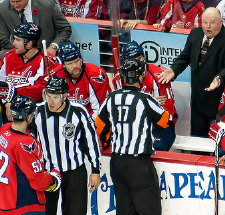Travel, Crowds, or Refs: What Creates Home Team Advantage?

New research has found that teams do better playing at home courts surrounded by fans not because the athletes are more energetic, not because opponents are intimidated by crowds, and not because travel takes something out of the visiting team.
Instead, economist Tobias Moskowitz, of the University of Chicago’s Booth School of Business, along with journalist Jon Wertheim, have “found compelling evidence that home-field or home-court advantage in all major team sports is principally due to the influence of referees,” according to a report by MIT News. “Crowds exert pressure on referees, who avoid incurring the wrath of fans by making close calls that consistently favor home teams.”
Moskowitz presented the findings at the MIT Sloan Sports Analytics Conference, which took place earlier this month. Held annually since 2007, the event provides a forum for researchers, sports executives, and students to talk about the way analytics is used in the sports business industry.

Videos of the 2011 panels are just starting to be posted online. The first video posted is on the future of the game day experience: HDTV vs. live events.
Sports fans and people intrigued with analytics might want to check out last year’s session highlight, a conversation about the limits of analytics and the decision making process that goes on behind the numbers. Moderated by Michael Lewis, author of the influential baseball analytics book Moneyball, it featured sports team owners/presidents Mark Cuban, Jonathan Kraft, Daryl Morey, and Bill Polian. A video of that conversation, “
